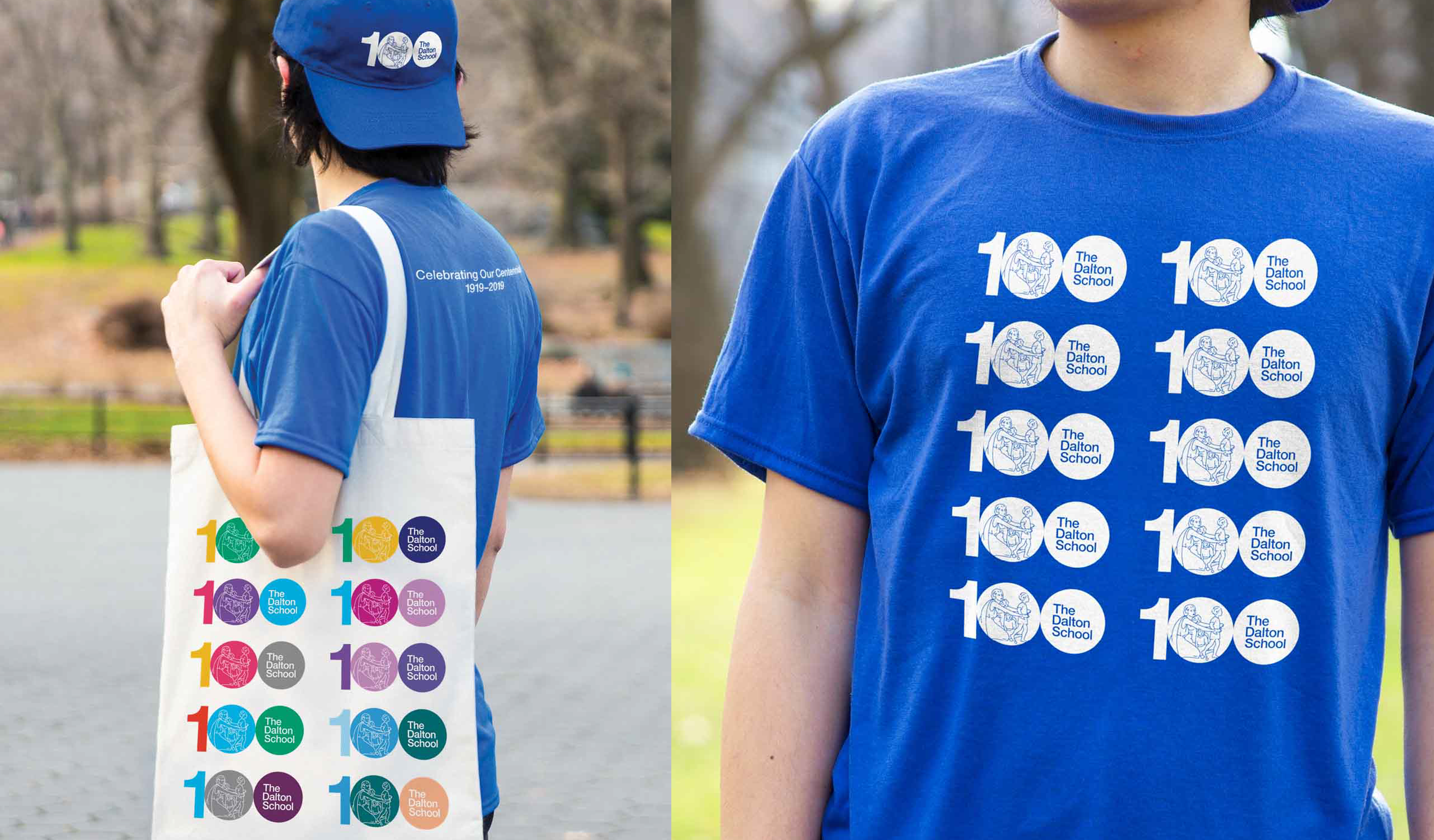The allure of limited edition items and exclusive products is undeniable. Have you ever wondered how businesses create such a frenzy around their commemorative anniversary merchandise, with customers eagerly lining up or refreshing their screens to make a purchase? The answer lies in the principle of manufactured scarcity. In this blog post, we will explore how you can effectively use this principle to create and sell commemorative anniversary merchandise that generates excitement and drives sales.

Above: Merchandise developed for the centennial of the Dalton School, a progressive private K-12 institution, leveraged the brand color of the organization and the centennial logo. The logo was designed as a “hijack” type, which takes over from the normal logo everywhere that it is easy to do so. Limited-edition anniversary merchandise leverages a number of marketing techniques to drive interest and sales.
Unleashing the Power of Manufactured Scarcity in Nonprofit Marketing Strategy
In the world of nonprofit organizations, capturing public attention and generating revenue are essential for sustaining impactful initiatives. One effective strategy that nonprofits can employ is the principle of manufactured scarcity. By creating a perception of limited availability and exclusivity, nonprofit organizations can ignite interest and drive sales of commemorative anniversary merchandise. In this article, we will explore how nonprofits can harness the power of manufactured scarcity to create and sell such merchandise, offering insights and strategies informed by successful case studies and consumer behavior research.
Limited Editions: Elevating the Significance of Charitable Offerings
Central to leveraging the principle of manufactured scarcity is the concept of limited editions. By designating a specific quantity of commemorative anniversary merchandise as limited editions, nonprofit organizations infuse these items with an aura of exclusivity and rarity. Whether it’s a special edition t-shirt, a unique collectible, or a customized variation of an existing product, limited editions have the potential to captivate donors and supporters, as they perceive these items to be both scarce and meaningful.
Time-Limited Offers: Creating Urgency and Encouraging Donations
Time-limited offers represent another powerful approach for nonprofits to leverage the principle of manufactured scarcity. By establishing a defined timeframe during which supporters can contribute and receive commemorative anniversary merchandise, nonprofits tap into the innate human inclination to act swiftly to seize an opportunity. Whether it’s a brief donation window or a limited-time offer spanning a few days, the temporal constraint intensifies the perceived value of the merchandise and motivates supporters to donate promptly to secure these exclusive items.
Exclusive Bundles and Packages: Amplifying Charitable Impact
Crafting exclusive bundles or packages presents a unique opportunity for nonprofits to leverage the principle of manufactured scarcity while amplifying their charitable impact. By combining multiple commemorative anniversary items into special limited bundles, nonprofits enhance the perceived value and exclusivity of the offerings. These bundles can feature a range of merchandise, such as a commemorative book, a personalized certificate, and a limited edition keepsake. Marketing these exclusive bundles as limited-time offers with a restricted number available not only fuels donor interest but also emphasizes the significance of their contribution to the cause.
Pre-Order Opportunities: Cultivating Anticipation and Enhancing Support
Pre-order opportunities provide a strategic means for nonprofits to generate anticipation and manufactured scarcity for commemorative anniversary merchandise. By allowing supporters to secure their items before the official release, nonprofits create a sense of exclusivity and scarcity. Communicating the limited number of items available for pre-order and emphasizing the opportunity to be among the first to receive these highly anticipated products intensifies donor interest and motivates early contributions. Additionally, pre-orders can generate early revenue, which can be directed towards supporting the organization’s initiatives.
Psychological Triggers: Inspiring Donor Engagement
To maximize the impact of manufactured scarcity, nonprofits can leverage psychological triggers to inspire donor engagement. One such trigger is the concept of social proof, which suggests that people are more likely to engage in a behavior if they see others doing the same. By showcasing testimonials, highlighting the support of prominent figures, and communicating the high demand for commemorative anniversary merchandise, nonprofits can foster a sense of exclusivity and scarcity, prompting supporters to take action and contribute to the cause.
Striking the Balance: Ethical Practices and Sustainable Impact
While manufactured scarcity can be a powerful marketing strategy, nonprofits must strike a delicate balance between scarcity and maintaining ethical practices. Transparency and integrity are paramount, as nonprofits must ensure that the perceived scarcity aligns with the actual availability of merchandise and the organization’s capacity to fulfill orders. By effectively managing the principle of manufactured scarcity and maintaining open communication with supporters, nonprofits can create and sell commemorative anniversary merchandise while fostering trust, long-term donor relationships, and sustainable impact.
Conclusion
In conclusion, nonprofits can effectively leverage the principle of manufactured scarcity to create and sell commemorative anniversary merchandise, generating increased revenue and donor engagement. By implementing limited editions, time-limited offers, exclusive bundles and packages, pre-order opportunities, and psychological triggers, nonprofits can capture public attention, amplify their impact, and inspire supporters to contribute to their cause. It is essential, however, to strike a delicate balance between scarcity and ethical practices, ensuring transparency and sustainable impact in the nonprofit sector. By effectively harnessing the power of manufactured scarcity, nonprofits can advance their missions and create lasting change in the world.
![C&G Partners [logo]](https://www.cgpartnersllc.com/wp-content/uploads/2022/07/CGP_Logo-black.png)